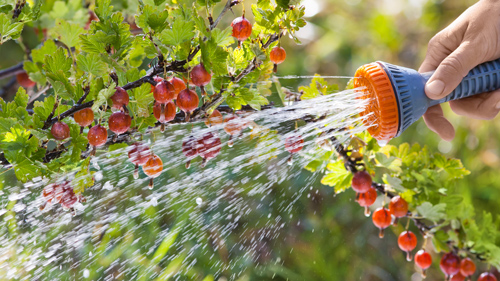
Plant Care During Extreme Heat
Taking care of your garden and orchard during the dog days of summer can be stressful. Here are some tips and tricks on Plant Care During Extreme Heat to give your plants the best chance to make it through a heat wave.
- Water plants deeply, ideally first thing in the morning while temperatures are still low and transpiration rates are low. Potted plants will probably want to be watered more than once a day during a heat wave. The next best time to water during hot weather is in the early evening. Trees and plants in or near irrigated grass yards will often want more frequent waterings as they can become spoiled and and often have shallower root systems. Generally speaking established trees will need deep waterings 2-3 time a week or more during heat waves. Soaker hoses, and drip irrigation work well for deep waterings as they insure there is less water run-off.
- Mulch deeply! If you don’t already have a thick layer of organic mulch around your plants, apply some before the temperatures really heat up. Organic mulch helps keep soil temperatures lower, retains moisture, keeps weed pressure down and improves soil health.
- Move potted plants to a shaded area. Plants in black plastic pots are more susceptible to having their roots fried in those hot pots than plants in ground are. While the heat wave persists move these plants to as cool of an area as possible. Also, beware of potted plants close to a wall that might receive radiant and or reflective heat during the day. Micro climates can increase temperatures by over 10 degrees.
- Set up shade cloth for young tender plants. Younger plants may not be able to handle the heat as well as more established plantings. Consider placing temporary shade cloth over them during the heat wave.
- Watch the leaves on your plants. Leaves wilt during extremely hot and sunny days as a defense mechanism. The wilting lowers the surface area exposed to the sun thus limiting transpiration and sunburn. However, if the plant does not perk up in the evening or after watering in the morning then it might be a sign of to much or too little watering.
- Install and irrigation system for you garden or orchard. The best defense for extreme weather is having healthy established plants. Caring for them year round with the right organic fertilizers and amendments, seasonal pruning, and good watering practices are the best way to insure your plants make it through extreme weather.
OGW’s Latest Highlights
Pruning Bare Root Fruit Trees
WHO WE ARE
At OGW we offer a diversity of food plants and their companions from around the world. We offer unique and rare fruit and nut trees, shrubs, and vines. We've been sharing our passion for edible plants and organic gardening since 1994. We are a family owned and operated nursery in Portland Oregon. We ship our seeds & plants to all 50 states. At our retail garden center we offer seasonal fruit tasting, preservation and plant care classes as well as hold events in the community. We support local food sovereignty- grow your own One Green World!
2025©ONE GREEN WORLD. ALL RIGHTS RESERVED - PRIVACY NOTICE - CONDITIONS OF USE
